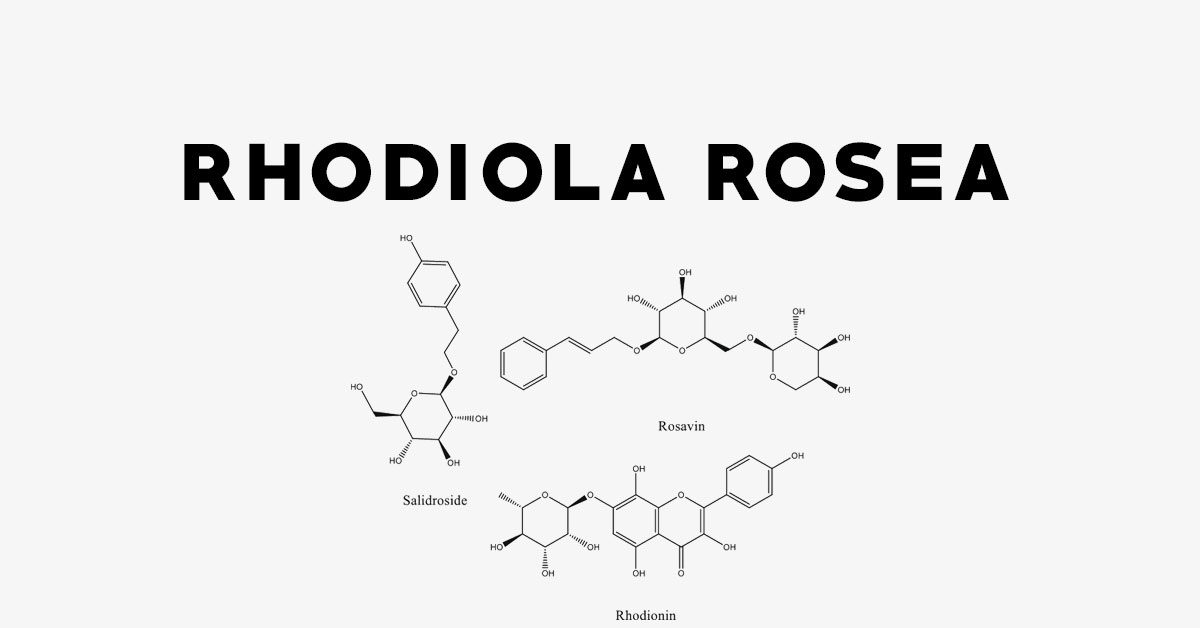
Rhodiola Rosea
Rhodiola Rosea is an adaptogen known to reduce physical and mental fatigue. It has also been shown to improve cognitive ability, reduce stress and anxiety and elevate mood.
Uses of Rhodiola Rosea
Rhodiola Rosea is a popular ingredient used in sports nutrition supplements due to its ability to reduce both physical and mental fatigue. You will find Rhodiola Rosea used in pre-workouts, fat burners and even nootropic supplements. You will see Rhodiloa Rosea standardized to Rosavin, Rhodionin and/or Salidroside.
In a systematic review of Rhodiola Rosea's impact on physical and mental fatigue, it shows that the evidence on increasing physical performance and reducing mental fatigue is contradictory. Out of 11 studies identified as meeting the criteria for review, 10 were randomized clinical trials and one was controlled clinical trials. The results indicated that two of six trials examining physical fatigue in healthy populations report Rhodiola Rosea to be effective as did three of five RCTs evaluating Rhodiola Rosea for mental fatigue. The report also suggests a high level of bias was injected into the studies.
In another study of Rhodiola Rosea on sport performance, Rhodiola Rosea was taken consecutively for four weeks. The results indicated that there was no increase in the participants HR Max, Borg Scale level, VO(2) max and duration of the test. On the contrary, Rhodiola Rosea was shown to reduce both lactate levels and parameters of skeletal muscle damage after an exhaustive exercise session. This means that Rhoidola Rosea may increase the adaptogen ability to physical exercise.
Another study concluded that participants who supplemented with 200mg Rhodiola Rosea showed improvementsT in endurance exercise performance. This four week study included 24 participants who supplemented with 200mg Rhodiola Rosea or a placebo. The measured time to exhaustion, which improved for the control group.
Rhodiola Rosea has also been shown to improve cognitive ability, elevate mood and reduce stress and anxiety. In one study, participants were given 400mg of Rhodiola Rosea or a placebo. Over the 14-day trial, the experimental group showed a reduction in self-reported, anxiety, stress, anger, confusion and depression at 14 days and a significant improvements in total mood.
Interactions with Rhodiola Rosea
Rhodiola Rosea is used in pre-workout supplements, nootropics and fat burners. Rhodiola Rosea will pair well with Caffeine Anhydrous, Beta-Alanine, Betaine Anhydrous, Synephrine, Hordenine, Higenamine and other stimulants you find in a pre-workout and a fat burner.
Rhodiola Rosea will pair well with other cognitive enhancing ingredients like Alpha-GPC, CDP Choline, Choline Bitartrate and Huperzine A for a nootropic supplement.
Side Effects of Rhodiola Rosea
Side effects of supplementing with Rhodiola Rosea are uncommon. The most frequent side effects are activation, agitation, insomnia, anxiety, and occasional headache.
Recommended Rhodiola Rosea Dosage
Rhodiola Rosea has a range of dosing protocols based on studies. The studies referenced above were dosed from 200mg-400mg per day. Other research suggests that the proper dosage of Rhodiola Rosea should be between 100mg-650mg per day. Do not exceed 650mg per day.
Recommended Supplements Featuring Rhodiola Rosea
The following products contain Rhodiola Rosea at the recommended dosage, and are recommended supplements for Fitness Informant:






